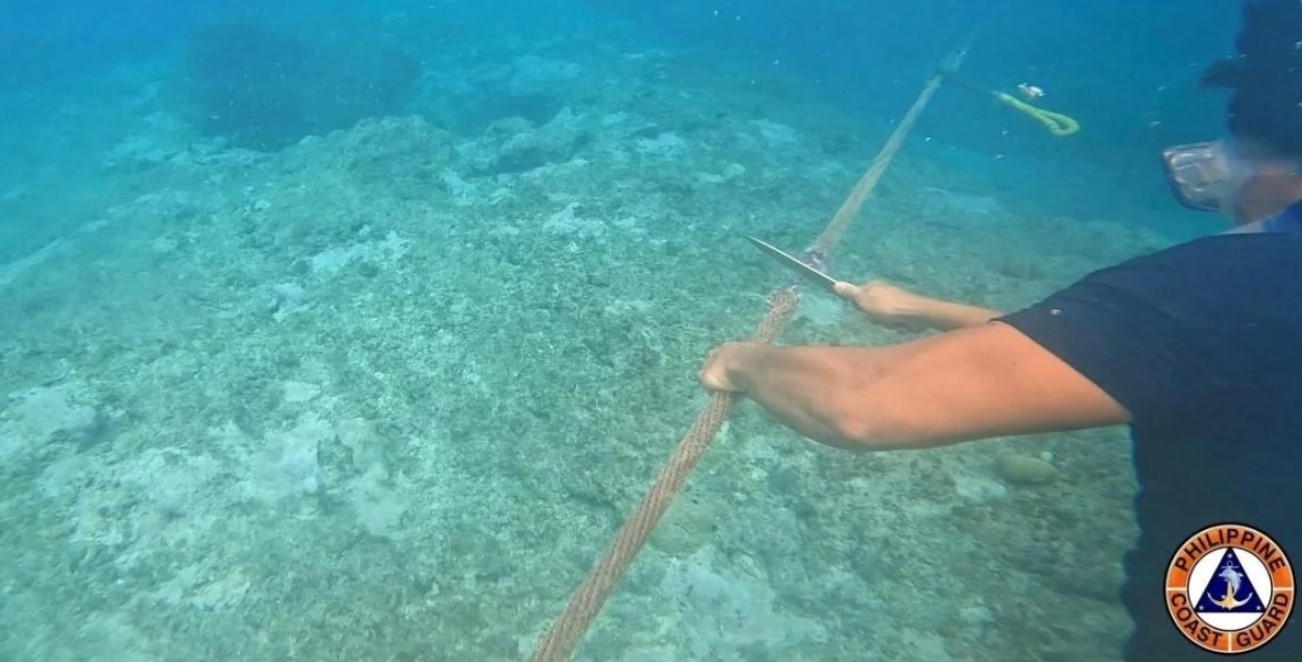The Chinese foreign ministry asserts that the shoal belongs to China and disregards the removal of its buoys.
Beijing has criticized the Philippines for removing a Chinese floating barrier in the South China Sea, calling it a “farce.” This dispute has escalated tensions between the two nations, and a Chinese observer suggests that Beijing is unlikely to back down in this latest maritime disagreement.
The conflict began when the Philippines protested the presence of a Chinese coastguard floating barrier at Scarborough Shoal on Friday. China’s foreign ministry argued on Monday that the barrier was legally established to prevent Philippine fishermen from entering the shoal’s lagoon.
In response, the Philippine Coast Guard announced on the same day that it had removed the buoys following orders from President Ferdinand Marcos Jr. However, on Wednesday, Chinese Ministry spokesman Wang Wenbin rejected this action and reiterated that Scarborough Shoal, known as Huangyan Island in China, is Chinese territory. Beijing affirmed its commitment to defending its sovereignty and maritime interests in the region.
“This so-called action by the Philippine side is purely a farce for its own amazement,” Wang said.
Scarborough Shoal, a triangular formation of reefs and rocks located approximately 120 nautical miles (222 kilometers) from the Philippine island of Luzon, is a disputed territory claimed by both China and the Philippines as an “integral part” of their respective territories.
In an effort to encourage their fishermen to continue operating in the area, the Philippine Coast Guard announced on Wednesday that it was considering various multi-law enforcement strategies to gain access to the abundant fishing grounds within the shoal.
According to Hu Bo, who serves as the director of the Beijing-based think tank South China Sea Strategic Situation Probing Initiative (SCSPI), it appears improbable that China would permit Philippine vessels to access the contested region.
Bo, also believes that unlike the recent standoff at Second Thomas Shoal, China is unlikely to yield in the case of Scarborough Shoal. During the Second Thomas Shoal confrontation, Beijing eventually reduced its response after nearly two weeks of tension when Manila attempted to resupply troops.
In the current situation at Scarborough Shoal, Philippine vessels attempted to enter the lagoon, a move seen as an opportunistic assertion of sovereignty claims. Hu suggests that this differs from the resupply mission at Second Thomas Shoal, which was seen as a necessity.
Notably, tensions have escalated in the South China Sea this year, with incidents in February involving a “military-grade” laser light accusation by the Philippines against China. Additionally, Manila announced in April that it would allow the US military access to several bases, drawing criticism from Beijing.
Furthermore, the Philippine Navy recently announced plans for a 12-day bilateral exercise with the US Navy to enhance defense cooperation.
Over a decade ago, Beijing and Manila found themselves in a heated confrontation when the Philippine Navy attempted to apprehend Chinese fishing vessels from Hainan Island, accusing them of illegal coral and giant clam collection in the Scarborough Shoal lagoon. China argued that its fishermen sought refuge in the lagoon due to adverse weather conditions.
This maritime standoff eventually escalated to economic boycotts. After two months, the Philippine government announced a bilateral agreement with China, allowing both countries’ vessels access to the shoal. However, Manila later claimed that Beijing did not withdraw its maritime law enforcement vessels as agreed.
The 2012 standoff is widely believed to have prompted the Philippines to initiate an arbitration case against China under the United Nations Convention on the Law of the Sea. In 2016, a tribunal in The Hague ruled that Beijing’s historical claims to most of the South China Sea were invalid, a decision China rejected.
(Source: Laura Zhou | South China Morning Post)









